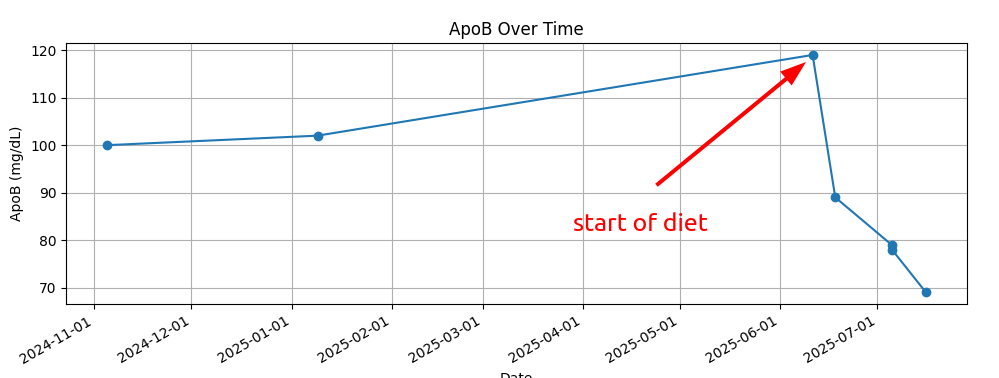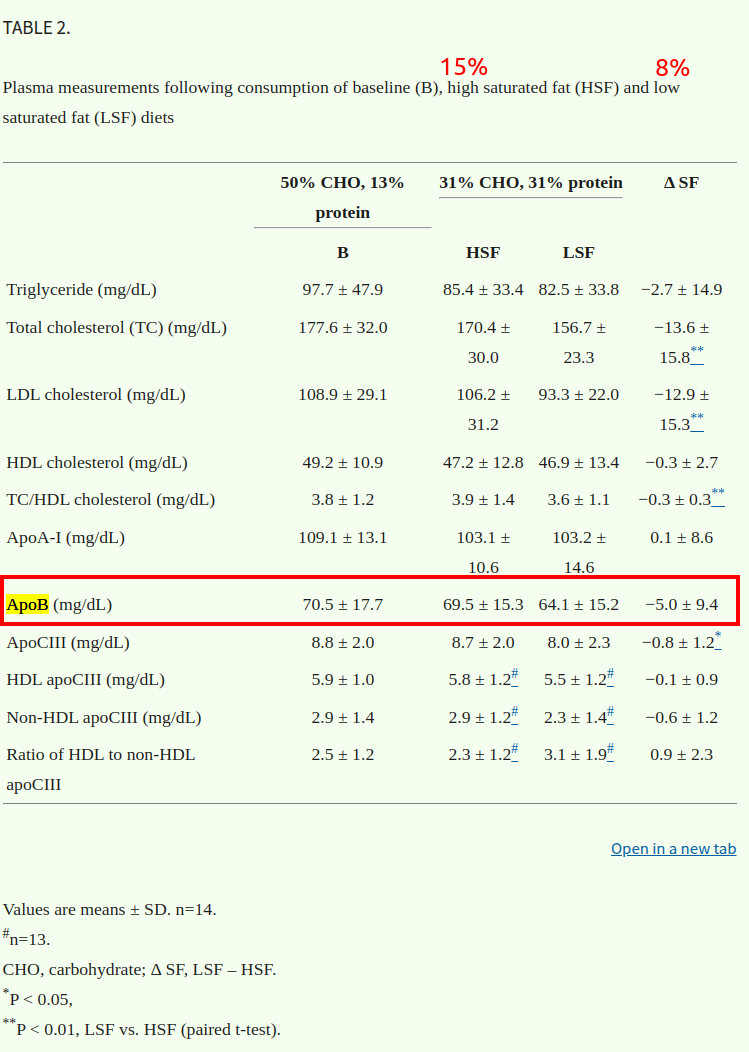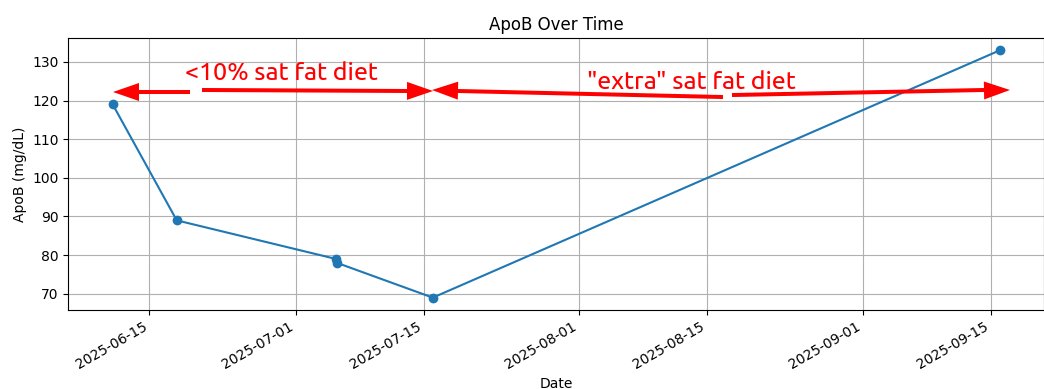Situation
I have high ApoB levels. Here are three levels taken in the recent past:
| Date | Value | Condition |
|---|---|---|
| 2024-11-05 | 100 | fasted |
| 2025-01-09 | 102 | fasted |
| 2025-06-11 | 119 | not fasted |
This means that I am in the ‘high risk’ category and have lower life expectancy on account of stuff accumulating in my arteries. How much lower life expectancy? I don’t know. The advice for people in this situation is often to eat less saturated fat. I’ve heard in various places that this might not be effective, and that things are “mostly genetic” and so on, so let’s put that to the test.
Going into this experiment I was pretty skeptical that anything would happen.
Diet
Composition
If saturated fat is bad, the diet is just to eat as little of it as possible. I arbitrarily decided that this meant that all meals must have <10% saturated fat on a calories basis, and I adhered to that diet with 100% accuracy. I made sure to look at the dietary breakdown of everything I ate.
This means:
- No dairy
- Only chicken breast and some fish as meat.
- No chocolate
- Only some nuts (no peanut for example)
- No avocado
- I did use olive oil a bit when cooking but made sure it was only a small spoonful in a whole meal. Olive oil is ~14% saturated fat so that still puts the meal at well under 10%.
My diet involved a lot of bread+hummus, beans and rice etc. I farted more than I ever have in my life. It also represented a large departure from my previous diet, which had a lot of dairy and a good amount of red meat in it.
Since the requirement was <10% on a per meal basis, many people suggested putting small amounts of saturated fat (like a small piece of chocolate or whatever) in the meal, since it would be more enjoyable but still meet the requirement. I did not do this, and I look down upon people who do. No metrics were gamed in the course of this study. I would estimate that maybe 5% of my calories were from saturated fat in practice, since many meals contained ~0.
Duration
The best information I could find at the time (via deep research) was a couple of studies that suggested ~5 weeks so that’s what I went with. I wasn’t really happy with their quality as they did not address the question explicitly but there you go. I’m not going to put myself through this for 6 months anyway.
Measurements
Does fasting matter?
The ‘study’ started on the 11th of July, and I got my results back a few days later. I had heard that fasting was not required for an ApoB test, so I didn’t fast. But then the results were +17 points from a previously stable baseline, which made me worried that this was a lie and it did matter.
So I did the logical thing and booked two blood tests two and a half hours apart from each other. The blood test center is quite close to my house so soon after getting my blood drawn I stuffed my face with bread, almond butter, honey, and numerous bananas.
The results were clear: 79 fasted, 78 nonfasted. I’m quite sure my blood glucose was through the roof at the time. This makes me much more confident that my measurement of 119 at the start of the study was correct.
Overall effect
Here is a table of all of my ApoB data for all timepoints:
| Date | ApoB (mg/dL) | Fasted? | Note |
|---|---|---|---|
| 2024-11-05 | 100 | Y | |
| 2025-01-09 | 102 | Y | |
| 2025-06-11 | 119 | N | Beginning of experiment |
| 2025-06-18 | 89 | Y | |
| 2025-07-05 | 79 | Y | 10:30AM |
| 2025-07-05 | 78 | N | 12:30PM |
| 2025-07-16 | 69 | N |

It’s pretty clear from this that the diet is wildly effective. People were asking my about my LDL throughout the experiment so I added a measurement on at the end and got 91. All tests were taken with ulta lab tests.
My results are wayyy more dramatic than what reading the literature would have you believe. Here are two (one, two) random studies that both predicted a ~5 point change in ApoB. One of the tables:

Look at the absolutely huge standard deviation on that result. What utter trash. The study says “Dietary adherence was promoted through regular telephone contacts and weekly meetings with the dietitians”. Sure it was.
Following this diet was really hard. I had to be exceedingly careful eating out, I regularly refused to eat what the people around me ate, and generally was a nuisance to the everyone around me. Also the food was a lot worse. I suspect that all these studies had really bad adherence.
Next steps
I’ve stopped this diet, and am now trying to eat as much saturated fat as possible in my diet. Let’s see how high this number can get. Then after that I might sit down and look up whether or not what the actual causal input-output relationship is for ApoB→life expectancy.
Conclusion
I dropped my ApoB by 50 points in 5 weeks, and it was still dropping at the end.
2025_09_16: Extra fat results
Since the last blood test I have increased the percentage of saturated fat in my diet. There was no specific target this time, but I did things like have a breakfast consisting of a cup of tea with 150ml of cream in it on the regular.
As a result I hit a new high score of 133.

Being able to control the apob level in both directions is a nice extra piece of evidence for a causal relationship.